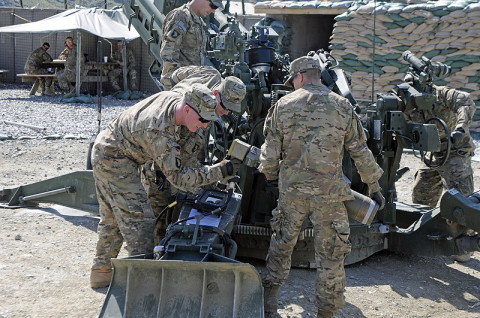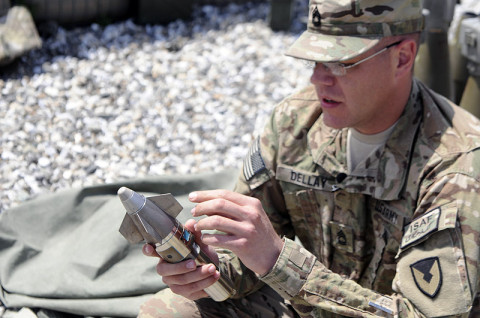Written by U.S. Army Sgt. Jon Heinrich
1st Brigade Combat Team, 101st Airborne Division PAO


Jalalabad Airfield, Afghanistan – U.S. Army Soldiers from Battery A, 2nd Battalion, 320th Field Artillery Regiment, 1st Brigade Combat Team, 101st Airborne Division have been training diligently with a new artillery fuse at Forward Operating Base Joyce, Kunar Province, Afghanistan.
The XM1156 Precision Guidance Kit fuse is a fuse with GPS capabilities that increases the accuracy of conventional High Explosive and Rocket-Assisted Projectile artillery rounds, according to U.S. Army 1st Lt. Anthony Jones, the platoon leader for 1st Platoon, Btry. A., and native to Ellsworth, Maine.

Jones said this is the Battery’s first time handling the fuse and they are being trained by a Military Transition Team.
“We did some training prior to the MiTT team showing up here, but we didn’t actually have the fuse to train on,” said Jones. “Once they showed up – they’ve been here for three days now – we’ve trained pretty much all day the last three days.”
U.S. Army Sgt. 1st Class Brent Dellay, the PGK Net noncommissioned officer in charge from the Fires Center of Excellence out of Fort Sill, OK, and native to St. Louis, MO, said they have travelled to different FOBs training other units, with Joyce being the third FOB in Regional Command-East.”
“This FOB is great,” said Dellay. “The crews are well trained, the leadership’s got a good handle on the operation and it’s one of the best gun positions we’ve seen in Afghanistan.”
Dellay stated that although the fuse is still new, it is being netted in theatre under urgent material release this year.
“Basically what we’ve got are conventional rounds which have been less than appealing to the maneuver commanders because of their accuracy,” said Dellay.
“Then you’ve got the Excalibur round which is precision, pinpoint accurate,” continued Dellay. “PGK fills the gap in the middle. It gives us very good accuracy on our standard high-explosive rounds.”

Jones mentioned that throughout the deployment his platoon has been supporting the battlespace owners, the Afghan National Security Forces, and the Security Force Advisory and Assistance Teams by being ready 24 hours a day, seven days a week.
“So anytime they leave the FOB and they need a fire mission, we’re the guys that provide that indirect fire,” Jones said.
The Soldiers fired six rounds with the fuse April 29th, becoming the first unit in the Army to fire the XM1156 PGK in response to troops in contact.
“The trainers were still there when we shot this fuse for the first time in combat,” said Maj. Aaron Miller, the operations officer for 2-320th FAR.
Miller explained that having the trainers standing by, observing the fire mission, gave the crew a boost of confidence while using the PGK fuse for the first time to support Soldiers on the ground.
Miller said that firing on a ridgeline is a difficult shot, “It’s like splitting a pea with a razor blade, and this round has the ability to split this pea.”
“The feedback from the observers was that we hit exactly where we wanted,” said Miller.
Besides increasing accuracy, the round is also significantly safer for Soldiers, civilians, and property.
Miller says that one of the safety mechanisms in the PGK fuse is that it will render itself inert if it is off target.
“The PGK fuse makes standard munitions ten times safer, gives maneuver guys more confidence to call for fire and reduces the risk to civilians persons and property,” said Miller.


